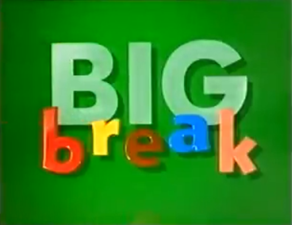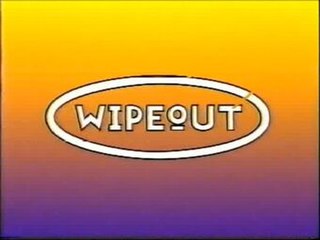The Generation Game is a British game show produced by the BBC in which four teams of two people from the same family, but different generations, compete to win prizes.
Call My Bluff is a British panel game show based on the short-lived US version of the same name. It was originally hosted by Robin Ray and later, most notably, by Robert Robinson. Its most prominent panellist was Frank Muir. The theme music for the show was Ciccolino by Norrie Paramor.

Big Break was a British television game show, created by Roger Medcalf, Mike Kemp and Terry Mardell, presented by comedian Jim Davidson and snooker commentator John Virgo, and broadcast on BBC One between 1991 and 2002. Inspired by ITV's Bullseye, the programme focuses on teams consisting of a contestant and a profesional snooker player competing in rounds that involve snooker, with the best team eventually seeing its player seeking to win prizes for their contestant. The series was notable for often featuring a unique round involving trick shots, and the chemistry between Davidson and Virgo.

Question of Sport is a British television sports quiz show produced and broadcast by the BBC. It is the "world's longest running TV sports quiz". Following a pilot episode in December 1968, broadcast only in the north of England, the series has run since 1970 and celebrated its 50th anniversary in 2020. It is currently presented by Paddy McGuinness, with team captains Sam Quek and Ugo Monye.

Live & Kicking is a British children's television series that originally aired on BBC1 from 2 October 1993 to 15 September 2001. It was the replacement for Going Live!, and took many of its features from it, such as phone-ins, games, comedy, competitions and the showing of cartoons. Once Live & Kicking had become established in series two, it reached its height in popularity during series four, when it was presented by Zoe Ball and Jamie Theakston; their final edition won a BAFTA award. After this the programme's ratings dropped with the launch of SMTV Live on ITV and the show ended in 2001.
Get Your Own Back was a British children's television game show created by Brian Marshall. Each episode staged a contest between teams of children – attempting to score as many points as possible – and their respective adults – attempting to make tasks as difficult as possible for their child contestants – playing a variety of games. The winning child earns a right to get revenge on the adult by ejecting them into a tank of gunge; adult contestants in the show are somewhat embarrassing, for a variety of reasons, to their child counterparts.

50/50 was a British children's television game show for BBC television. Airing on BBC One's children's television block, it was first broadcast on 7 April 1997 and ended its run on 12 July 2005 after 9 series. Repeats aired on BBC One, BBC Two and the CBBC channel until 2009.

See It Saw It is a children's game show about a king who rules over the kingdom of "Much Jollity-on-the-Mirth". It ran from 6 January 1999 to 26 March 2001. The programme was filmed entirely in a studio, with an audience of children, who at various points in the show would be asked an observation question by the King, which they would answer by climbing on board a giant see saw.
This is a list of British television related events from 1999.
This is a list of British television related events from 1998.
This is a list of British television related events from 1997.
This is a list of British television-related events from 1996.
This is a list of British television related events from 1995.
This is a list of British television related events from 1992.
This is a list of British television related events from 1991.
Outtake TV is a blooper show originally hosted by Paul O'Grady, then by Anne Robinson and finally by Rufus Hound. The show replaced BBC One's original blooper show Auntie's Bloomers and consisted of various clips past and present of bloopers from TV and film. Various special episodes were aired, consisting mainly of clips from one programme, most notably EastEnders and The Weakest Link.

Crimewatch is a British television programme produced by the BBC, that reconstructs major unsolved crimes in order to gain information from the public which may assist in solving the case. The programme was originally broadcast once a month on BBC One, although in the final years before cancellation it was usually broadcast roughly once every two months.

Wipeout was a British television quiz show for BBC One, based on the original American programme of the same name. First shown on 25 May 1994, it ran for nine series: the first four of which aired at primetime and were hosted by Paul Daniels; and the last five at daytime and hosted by Bob Monkhouse, with the final episode airing on 17 April 2003, 8 months before Monkhouse died on 29 December 2003.






